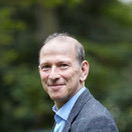It was just before Christmas. William Sieghart was prescribing poems at a pharmacy in West London when the security guard walked in and informed him that his 3.30 pm appointment was cancelled and wondered whether he could take the absent person’s place.
When asked what was on his mind, the security guard confided that he was 32 and, while he had come out when he was 24, he hadn’t had a relationship.
‘I thought that was really sad,’ says William, ‘and I asked him what he thought that was about. He said, “I don’t know, I’m kind and loving, I’m upbeat and positive and so on. But, I’m Muslim and I’m gay, and I can’t be both.”
So, I said, “Yes, you can actually.”
I don’t want to make out that I’m some Muslim scholar, but I found a poem which was written 700 years ago by Hafiz, a Sufi mystic, who I think is the greatest poet of all time.’
Form and catharsis
The poem speaks tenderly of love between men and women, men and men, and women and women. At the time there were a lot of tears and much hugging, and the man is now in a relationship.
For William, this potentially life-changing encounter is an illustration of the extraordinary power of the poetic form to provide catharsis and make our human experience bearable and less lonely:
“That, I think, is the power in it. That sense of complicity you get for how you feel. You don’t necessarily have the language to express it yourself, but somebody else can express it much more elegantly than you can.
You’re not alone! You’re not mad, you’re not sad, and what’s more, if they wrote it 700 years ago, everybody has to go through this. It’s part of life”.
He cites an Alan Bennett quote to illustrate his point:
The best moments in reading are when you come across something — a thought, a feeling, a way of looking at things — that you’d thought special, particular to you. And here it is, set down by someone else, a person you’ve never met, maybe even someone long dead. And it’s as if a hand has come out, and taken yours.
William, founder of both the Forward Prizes for Poetry and National Poetry Day, began prescribing poetry by accident.
He was being interviewed about his anthology Winning Words: Inspiring Poems for Everyday Life (2012) at Port Eliot Festival in Cornwall where a friend suggested he was put in the corner of a tent with two armchairs and a prescription pad.
“I thought it would be a bit of a gimmick,” William says, “so I did my talk and then sat in the tent and thought I’d do it for an hour. Five or six hours later, with a very full bladder, I was still there! That was the beginning of it. I realised that having spent my whole life trying to get poetry out of Poetry Corner, I had suddenly found the crossover”.
A thought which you had thought special and particular to you is set down by someone else, a person you have never met, someone even who is long dead, and it’s as if a hand has come out and taken yours.
– William Sieghart
Poetry, truth & experience
While poetry had been his friend from a young age, one particular experience in his mid-twenties proved a light-bulb moment for its worth – a man was hit by a car in front of him on the Cromwell Road in London. He helped save the man’s life and watched him being taken away in an ambulance.
He was left standing with blood on his hands and a poem in his head – Philip Larkin’s ‘Ambulances’, which talks about the moment when one sees an ambulance on the street:
‘Poor soul, they whisper at their own distress’…those words — and the large gin and tonic I’d had at the pub — the combination of the two started to make me think, “I can make sense of this”.
There is something about the short encounter and power of poetry that enables people to go straight to the heart of the matter, and fifty per-cent of those who come for a prescription end up using his box of tissues.
Loneliness is the issue that most often presents itself, in an age of social media and inauthenticity where there are fewer opportunities to reconnect and communicate on a genuine level.
“It’s a strange world we live in now, where almost nothing is like it is. Social media is full of avatars, people putting up a fake sense of self. They’re not saying, “I’m miserable”, “I’m lonely”, “I’m being betrayed” or “I’m sexually frustrated” – the last thing they’ll do is say how they might feel”.
People aren’t saying, ‘I’m miserable’, ‘I’m lonely’, ‘I’m being betrayed’ or ‘I’m sexually frustrated’ – the last thing they’ll do is say how they might feel.
– William Sieghart
William’s book is selling well, and he is delighted with the idea that it is being found in the self-help section of bookshops.
“The inauthenticity of modern life is so corrosive and so damaging to our sense of self, our soul and our sanity, that actually there’s something very, very powerful about the concision and beauty and lyricism of words expressed in a way that makes you feel complicit. That’s why poetry is so powerful in the modern era.”
***
William Sieghart has served as a guest on our Therapeutic and Reflective Writing course, run by Anne Taylor and Victoria Field.
The Poetry Pharmacy: Tried-and-True Prescriptions for the Heart, Mind and Soul is published by Penguin.























